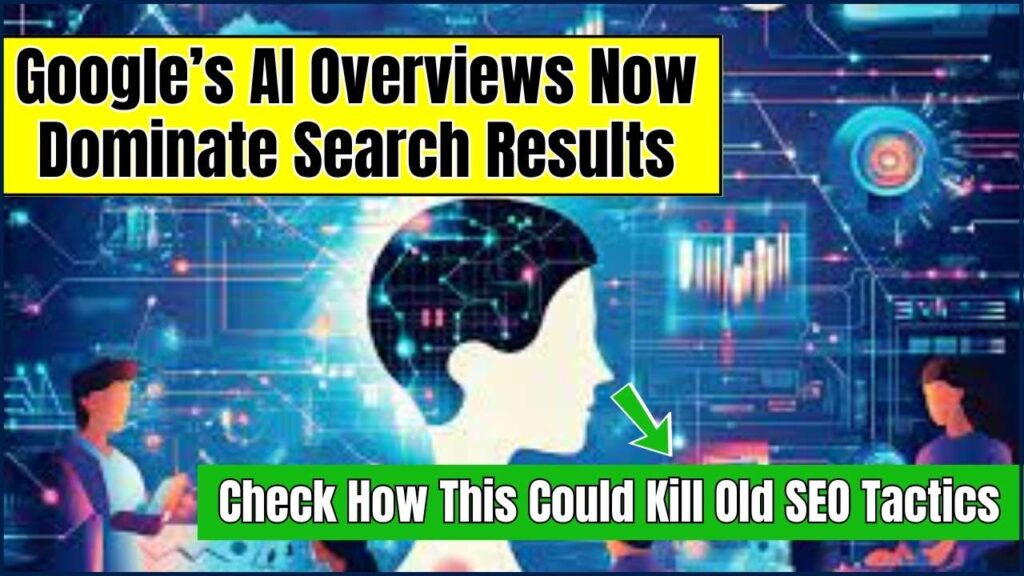AI Overviews Now Dominate Search Results: If you’ve searched anything on Google lately—like “best retirement states,” “simple pasta recipe,” or “how to apply for Medicare”—you might’ve noticed a box at the top of your results that seems to just know what you want. That’s Google’s AI Overviews, and yeah, they’re taking over the search game fast.
Rolled out broadly in 2024 and dominating SERPs in 2025, these AI-generated summaries pull info from multiple sites to give users an instant answer. No scrolling. No clicking. Just the info. For everyday users, this feels like magic. For websites trying to get traffic? Not so much.

AI Overviews Now Dominate Search Results
| Aspect | Details |
|---|---|
| Launch Timeline | Introduced in 2024, widely adopted in 2025 |
| Visibility | Appear in 42.5% of top search results |
| CTR Impact | Avg. 15.49% decline when AI Overviews are present |
| Niche Drop (Non-branded) | Nearly 20% click-through drop |
| Industries Affected | News, e-commerce, health, education |
| Solutions | Generative Engine Optimization (GEO), Answer Engine Optimization (AEO) |
| Official Help Docs | Google Search Central |
Let’s call it like it is: Google’s AI Overviews have flipped the SEO playbook on its head. But that doesn’t mean you’re doomed—it just means it’s time to evolve. By learning how to write for AI, using GEO and AEO, and building structured, clear, and conversational content, you can still win traffic, visibility, and revenue.
Old-school SEO is fading, but smart, adaptive SEO? That’s just getting started.
What Are Google’s AI Overviews?
AI Overviews are smart summaries you now see at the top of many Google search pages. Powered by large language models (LLMs), these overviews synthesize top sources to give a comprehensive answer to your question—without the need to click into websites.
Let’s say you search for “symptoms of low iron.” Instead of showing WebMD or Mayo Clinic first, Google’s AI pulls key facts from those and summarizes them at the top. Fast for users. Devastating for traffic-hungry publishers.
A Quick Look at Google’s Search Evolution
To understand this shift, let’s rewind:
- Early 2000s: Blue links. That’s it. You search, you click.
- 2012: Google Knowledge Graph begins—showing side panels with facts.
- 2017–2019: Featured Snippets and “People also ask” dominate.
- 2023–2025: Generative AI enters search, and Overviews begin replacing even snippets.
AI Overviews are the next logical step—but they change the rules entirely.
Who’s Feeling the Pain?
Click-Through Rates
A study across 700,000 keywords shows:
- 15.49% average CTR drop when AI Overviews are present.
- 19.98% decline for non-branded keywords.
- 27% CTR loss for low-ranking results.
- News publishers like MailOnline reported a 50% traffic crash for certain terms when AI Overviews appear.
Ad Revenue and Affiliate Sales
Less traffic means fewer ad impressions, less affiliate link clicks, and weaker lead generation—especially for content-heavy blogs or product review sites.
Visibility for Mid-Sized Brands
While big brands like WebMD may still be cited, mid-tier blogs or niche experts often get scraped but not credited. Google’s AI grabs the info, but users don’t know or visit the original source.
The Good News? There Are New SEO Strategies
GEO: Generative Engine Optimization
GEO helps you write content that’s AI-friendly—so you’re more likely to be included in Overviews.
How to do GEO right:
- Use schema markup (like Article, FAQ, Recipe).
- Include stats and data from authoritative sources.
- Write in a natural tone—answer how someone might ask on voice search.
- Add sources and update content regularly.
Tools like Google’s Rich Results Test and Schema.org help you get it right.
AEO: Answer Engine Optimization
AEO is like SEO, but for answers. This includes ChatGPT, Bing Copilot, and now Google AI Overviews.
How to boost your AEO game:
- Create FAQ blocks in every article.
- Use structured Q&A formats.
- Be clear, direct, and concise.
- Provide supporting context for answers.
Both GEO and AEO are about creating AI-ready content. It’s not just about humans anymore.
Where AI Overviews Fall Short
Not everything about these AI Overviews is golden.
- AI Hallucinations: Sometimes, they get it wrong. Google admits this and displays warning labels like “Generative AI content may not be accurate.”
- No source control: If your site is cited, you may get zero credit—or worse, misrepresentation.
- Lack of nuance: Summaries may oversimplify or strip out essential context.
- Top-of-funnel only: Overviews are fine for questions like “what’s the capital of Alaska,” but useless for complex decision-making like “should I buy term or whole life insurance?”
Real-World Case Study: Recipe Bloggers Feel the Hit
Meet Jamie, a mom running a small food blog from North Carolina. She used to get 50K+ views a month from organic searches like “quick chicken alfredo.” Since AI Overviews rolled out, her clicks fell 35%.
Why?
Google now shows the entire recipe in the AI Overview—steps, ingredients, cooking time—without needing to visit Jamie’s blog.
What saved her?
- Added structured recipe schema
- Created short YouTube video embeds
- Wrote FAQs like “Can I freeze chicken alfredo?”
- Focused on unusual variations like keto or dairy-free versions
Traffic rebounded 12% within 2 months.
Voice Search and AI: A Perfect Storm
Let’s not forget—AI Overviews also align with how folks are using voice assistants (Siri, Google Assistant, Alexa). Voice queries are often full-sentence questions, just like the kind that AI Overviews thrive on.
If your content sounds like how people speak, you’re in the game.
Tools to Help You Adapt
Here’s a quick cheat sheet:
- Google’s Search Central Blog
- Rich Results Test
- Answer the Public – for trending questions
- SurferSEO or Frase – for optimizing long-form content for AI
FAQs About AI Overviews Now Dominate Search Results
Q1: What are AI Overviews?
They’re Google’s new AI-generated summaries that appear at the top of search results, combining info from multiple websites to answer queries instantly.
Q2: Are AI Overviews bad for website owners?
Not inherently, but they can drastically reduce clicks, impacting traffic and revenue for traditional SEO-based sites.
Q3: How do I make my content AI-friendly?
Use schema markup, write naturally, answer questions clearly, and update often. GEO and AEO are your best friends here.
Q4: Can I opt out of AI Overviews?
Not currently. However, you can use data-nosnippet tags to prevent certain text from being scraped.
Q5: Are AI Overviews always accurate?
Nope. They can hallucinate or misquote. Google usually includes a disclaimer if confidence is low.











